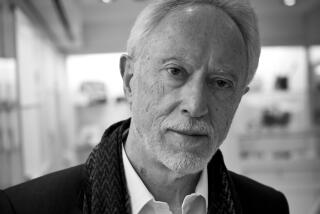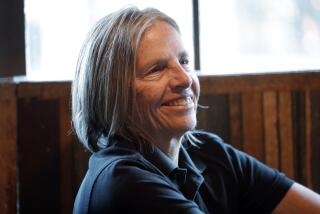Ecce Nietzsche
- Share via
Nietzsche is one of the irregulars, the awkward squad like Giovanni Battista Vico and Johann Gottfried von Herder and Johann Georg Hamann who even at the height of the Enlightenment distrusted the exclusive claims of reason to disclose human truth. A late Romantic and an early Modernist, he was a writer of superb style and insight who anticipated much of what Freud would say about the discontents of civilization and the need to befriend our frightening passions. But when, as critics, we claim these labels and affinities for Nietzsche, it is out of a kind of desperation to make him belong somewhere. Nietzsche himself had no sense of belonging, nor did he belong. I often think he is so much loved, despite his bombast and his destructiveness, because he cuts such an unprotected figure. He is this brave human being who destroys each and every one of his supports in life as he briefly passes this way. To be involved in Nietzsche’s existence hurts because there is so much loss to bear. But the deeply personal quality and the sharpness of his writing compensate. The dark humor, the manic imagination, the trenchant judgments and the despair that fill his void enrich us immeasurably.
When Nietzsche died a hundred years ago, on Aug. 25, 1900, he had existed in mental darkness since 1889. The few glimmers of light which allowed him to go on playing Wagner at the piano in his first hospitalized weeks soon dimmed. In Turin in January that year he collapsed after a final intense struggle against a decaying brain. Though the nature of his illness is still disputed, it looks to have been an atypical case of syphilis, the tertiary stage almost miraculously held at bay by the victim’s relentless efforts at self-cure. Destroyed by brain-wasting, Nietzsche’s handwriting, graceful and regular as a Bach fugue, unraveled to a barely legible string. His mouth fell into uncontrollable grimaces which, to cover up, he pretended he had assumed deliberately. As the frontiers of his identity also blurred, he became the dead Vittorio Emanuele, King of Savoy, and Jesus Christ. His body could no longer give his thoughts a form to live in. It is a miserable picture, made worse by the fact that this fleshly remnant with the name Nietzsche lived for another 11 years under the care of his sister Elisabeth in Weimar. Yet I like to dwell on it because it seems like a point of truth before Nietzsche became a legend; before Elisabeth welcomed Hitler to the Weimar villa and presented Mussolini with a silver-bound edition of the collected works.
The true Nietzsche has no practicable politics and no time frame. He addressed himself vaguely to free spirits and to a future in which in his atheism and his extreme individualism, and also in his science of joy, he might feel more at home. But the man who made his historical currency out of “eternal recurrence” was not an optimist. The only copula he could imagine between himself and a more inviting world was a long period of “bloody wars.” Nietzsche had a violent imagination nourished by the Bible. To let it run rampant was one of his ways, in the writing that was his life, of doing without spiritual support.
He didn’t belong to any place, despite sometimes imagining that he belonged to a European future that would transcend national pettiness. There was a time when, by an accident it is pleasing to construe symbolically, he had no passport. In 1844 he was born in southeastern Germany, in Saxony, in the village of Rocken, to a family which had seen three generations represent the Lutheran Church. But by the time Nietzsche took stock of his homeland, the chauvinism of Bismarck’s first empire disgusted him. Wagner’s embrace of German patriotism was part of what drove Nietzsche away from his greatest friend. Nietzsche had already left Germany for Switzerland, where he taught at the university in Basel, when illness compelled him to join the small cohort of rich peripatetic Victorian semi-invalids who wintered in Nice and summered in the Alps in search of a healing climate. He became, to echo the title of his 1880 addition to “Human All Too Human,” a wanderer, talking to his shadow.
Some of the most moving and ridiculous things that Nietzsche wrote, and which are contained in his “autobiography,” “Ecce Homo,” follow from his repudiation of all things German. He hated the heavy food, the dull skies, the heritage of Pietism from his mother and the memory of having no choice but to be a good boy, oppressed by Christian metaphysics. When he first saw Naples and weighed the lightness of Italy against his spiritual past, he wept. Nietzsche’s language, his musical aesthetic, his love of Italian food and of the colors that the Fauves would soon discover for European painting, helped to focus his cult of joy on real objects and real pleasures “close to hand.” How wrong the northern world, and the German Idealist world was to seek human fulfillment in metaphysical absolutes! “I have often asked myself whether, taking a large view, philosophy has not been merely an interpretation of the body and a misunderstanding of the body” is the question that rings out from “The Gay Science.”
*
Lightness was Nietzsche’s stylistic goal, and because he believed that style was life, he developed a style and an aesthetic which reinforced his unwillingness to be tied down. The rare air of the mountains was a personal symbol for him, along with words like “finesse” and “subtlety,” though they already hint at a private metaphysic returning. It is impossible to be human and wholly weightless.
Mostly Nietzsche needed to be physically alone, and kept himself apart, though lack of contact with friends and family made him fantasize about the thoughts of strangers in his direction, in a way that Freud would have recognized as paranoid. But Nietzsche was lucid in his loneliness, as his hundreds of letters to friends testify.
His strange life, mentally over at 44, supplied the stuff of a body of writing which equated the imaginative existence of the individual with supreme joy. But the writing was also about disguise and the absence of a fixed identity. Nietzsche loved the idea of wearing masks and costumes, as if life were one long ballo in maschera. He saw himself as an actor playing the part of a great man. Had he written a novel about how it felt to be “Nietzsche” walking down the street, it surely would have been a Modernist masterpiece.
What always worried him was the fixed nature of writing. Once he had said a thing his readers would hold him to it. They would read him literally. They would fix on his words. Philosophers used to grumble that Nietzsche contradicted himself on everything, which made it difficult for them to pin him down. But of course he cultivated the contradiction. In a way he didn’t want a heritage, didn’t want to become an industry after his death. He said those who walked away from him would be the first to understand him. Yet one of his contradictions was the desire to be recognized for his suffering life, even to be seen as a prophet. Hence that title, “Ecce Homo.” It is not ironic. Nietzsche’s writing is packed with switchback emotion. We lose our bearings, tossed about in that rarefied air. How terrible it is for a philosopher to be misunderstood, Nietzsche says, but how much worse to be understood, for those who understand have to pass through the same suffering.
When we read him, he seems to hope we will draw no conclusions, remember no particular words, but let his presence transform us. Yet he coins terms and manufactures slogans that stick disastrously in the mind, like the idea of the ubermensch, the super- or overman, and the exhortation to live dangerously, which seem deliberately to tempt the reader to take them out of context, and retain them as a shorthand guide to a thinker who is otherwise irreducible. The temptation is all the greater because it is very difficult to pick up a volume of Nietzsche and say “what he is about.” Everything he says is tricky and qualified, and deeply rooted in the beauty of his style.
He offered his life as an exemplary life, his style as that example, and he invited exemplary readers. He pictured his readers as living, like himself, at a time when high culture was in irreversible decline, but still powerful enough in memory to provoke some of his most moving words in “Human All Too Human”:
“Just as in old age one remembers one’s youth and celebrates festivals of remembrance, so will mankind soon stand in relation to art: it will be a moving recollection of the joys of youth. Perhaps art has never before been comprehended so profoundly and with so much feeling as it is now, when the magic of death seems to play around it.”
Jacques Derrida’s strategy of reading and writing “under erasure” looks like a tribute to Nietzsche, who tried to live his whole life sous rature. Nietzsche didn’t want to be pinned down, that is, captured by words.
But Derrida deprives us of the life motivation for such a radical move, which makes his writing relatively dry. Nietzsche canceled his life as he went, celebrating transience, because he mourned the death of the eternal God. Because he wasn’t just struggling intellectually to write a non-Christian account of pain, but vomiting and suffering migraines for days on end, he fastened on rare moments of self-transcendence. Nietzsche wanted to invent an account of pain which would not drag a man down, not make him a victim, but allow him to go on in his self-determining glory. This glory would be a fantasy, but also man’s ultimate art.
Nietzsche wrote that high art was dying, but that at the same time the art of self-making was in the ascendant. I see the truth of his prophecy in the deliberately blurred divisions between fact and fantasy in present-day writing, in the rise of public confession as a competing art form, in the whole phenomenon of therapy and specifically in the notion that to deal with our problems “as an artist would” is the way to self-mastery. I see the truth of Nietzsche’s prophecy in the fact that self-mastery has become an uncontested personal goal. It does not matter if our “artistic” products are worthless and that time spent writing our own stuff is time spent not reading Shakespeare and Milton. The tradition of self-making has superseded high art.
And yet our culture of self-realization is already out of date in the 21st century. We feel self-making has had its day when we read Nietzsche. That aspect of his work is most easily absorbed when we are young and now it seems juvenile. Partly thanks to Nietzsche’s influence, we have grown up in more liberated and less doctrinaire Western societies. Our agenda as individuals no longer needs us to be anti-social. Those who feel that Nietzsche should be put away with childish things are right. We need to be social beings too. But Nietzsche’s delicacy, his lightness, his skill at not belonging anywhere will never be anything but essential company for our spirits when we are alone.
More to Read
The biggest entertainment stories
Get our big stories about Hollywood, film, television, music, arts, culture and more right in your inbox as soon as they publish.
You may occasionally receive promotional content from the Los Angeles Times.










